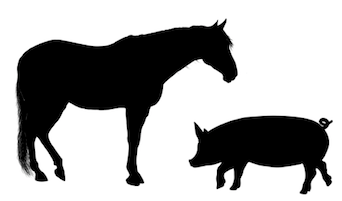FDA Issues Alert for Potential Risk to People With Altrenogest Products
It is essential that people administering altrenogest products, intended for use in horses and pigs, take appropriate precautions to prevent human exposure to the medication, the FDA has warned.

The FDA has issued a warning for veterinary professionals and others who work with horses and pigs about the potential risk of reproductive system disorders and other adverse effects resulting from exposure to altrenogest, a synthetic progesterone used to suppress estrus in mares and synchronize estrus in gilts.
The progestin is marketed under various names:
- For horses: Regu-Mate, OvaMed, Altren — Require a prescription
- For pigs: Matrix, ChronoMate, SwineMate — Available over-the-counter
The FDA has received 130 reports of accidental human exposure to altrenogest products between October 6, 1987 and May 30, 2018. Most of the reports (121) were for Regu-Mate; 9 reports were for Matrix.
Adverse effects were reported in 137 people; 18 were teenage girls, some as young as 14 years of age. Exposure was most commonly reported following drug contact with the skin, but some reported exposures occurred in conjunction with touching product residue on barn surfaces, equipment, and treated animals.
RELATED:
- Review of Nonsteroidal Anti-inflammatory Drugs in Horses
- Factors That Adversely Affect Reproductive Success in Mares
Reported reproductive adverse effects include abnormal or absent menstrual cycles in women and girls, and decreased libido in men. Other reported adverse effects include headaches, fever, abdominal pain, nausea, diarrhea, vomiting, and rashes.
Despite the fact that only 2 of the marketed altrenogest products have been associated with adverse events, the FDA is still warning practitioners and animal handlers of the potential risk related to the other generic products as they are used in the same manner.
“The FDA has been in contact with Merck, the sponsor…of the pioneer products Regu-Mate and Matrix,” the FDA wrote in a statement, “to discuss ways that the labeling and packaging of these products could be modified to enhance safety to the user.”
Veterinarians, horse owners, and employees of swine and equine facilities are encouraged to report any adverse drug events to the product manufacturers.